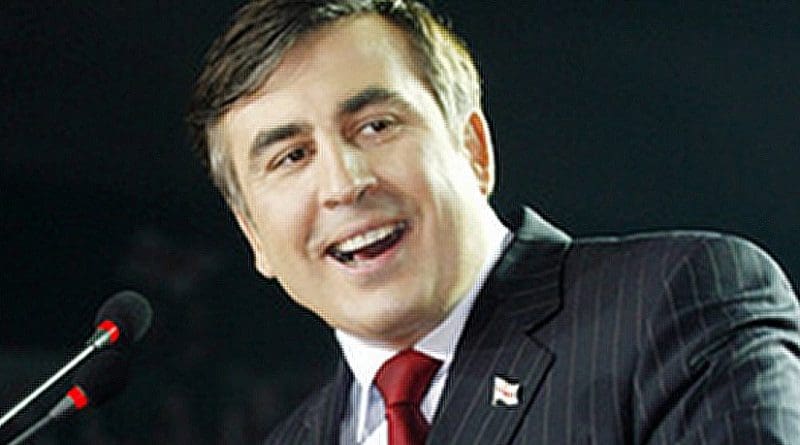Roundtable: Misha Goes To Washington – OpEd
By Evolutsia
Monday’s meeting between Mikheil Saakashvili and Barack Obama: a major deal or business as usual? Evolutsia.Net’s roundtable sounds off on the issue.
On January 30, Georgian President Mikheil Saakashvili met with U.S. President Barack Obama in the Oval Office [Video and transcript]. To discuss the significance of the meeting, Evolutsia.Net convenes a roundtable to lend some added context. Sounding off are: Inge Snip, Evolutsia.Net analyst; Kornely Kakachia, TSU political scientist and director of the Georgian Institute of Politics; and Michael Cecire, Evolutsia.Net publisher.
Inge Snip, Evolutsia.Net:
Besides an unfortunate slip of the tongue by Obama referring to Georgia as Russia, the talk itself was not as exciting as one could have hoped for. Obama mostly ‘reassured’ support for Georgia’s democratic developments, ‘reinstated’ support for Georgia’s NATO aspirations, and ‘reconfirmed’ respect for Georgia’s institution-building over the past few years. The only fairly interesting phrase could have been Obama’s comment on ‘exploring’ the possibility of free-trade agreement, something the media picked up on right after the talk. But that was before Saakashvili had his press-conference.
According to Saakashvili they had talked about ‘strengthening’ their defense cooperation, however, this seems not what Obama had said, as he referred to it as ‘sharing’ information. So, what is the deal here? It should come as no surprise that U.S. rhetoric and policy play a vital role in Georgia’s domestic political field. Further, the ruling party and the president have put major stress lately on enhancing Georgia’s defense mechanism — in both anti-oppositional tactics (claiming that being opposed to this, makes one a Russian agent) and anti-Russia rhetoric. However, Obama has been holding back on supporting Georgia too much on this issue due to his aspiration to have better relations with Russia. And, one should wonder whether, ultimately, arms-sale and openly supporting Georgia would constitute a positive development for Georgia; Russia might get so irritated that they could try to invade again.
It would not surprise me as the Kremlin has shown that it is very easily irritated by ‘western’ ideas in its preferred ‘sphere of interest’. That being said, it is understandable that Georgia wishes to build its defense mechanisms, having a neighbor which is so easily spurred to anger. So, which way to go? I am not sure, however, misinterpreting the American president probably never is a really good idea – whether or not unofficial talks assure you of an arms-deal.
Kornely Kakachia, Tbilisi State University and the Georgian Institute of Politics:
The meeting between the two leaders has significant importance for Georgia, as it was first meeting of leaders in the Oval Office since the Obama administration took office. As Georgians expected more emphasis on hard security issues, including a sort of upgraded status on Georgia’s NATO bid in upcoming Chicago Summit, it seems that White House has given priority to a bilateral free trade agreement. However the meeting also challenges the narrative that Georgia’s “special relationship” with Washington has cooled significantly under Barack Obama’s less ideological and more pragmatic administration.
The Georgian political elite got a clear message from U.S. that despite some success in political reforms, Georgia still has to deliver a success story on the handling of a peaceful transition of power in the upcoming elections in order to become an electoral democracy. While this meeting has no significant global implications, it was useful for both leaders in order to assure their constituencies. For Obama, the message was that his administration is not “soft” (referring to Republican criticism) on Russia and has not forgotten its friends and strategic allies worldwide. For Saakashvili, the meeting indirectly translates to the message that despite some shortcomings on building democracy in Georgia, the U.S. stands behind Tbilisi’s democratic transformation efforts, including supporting bilateral military cooperation to deter Russia’s neoimperial ambitions.
Michael Cecire, Evolutsia.Net:
President Obama’s previous hesitation to meet Georgian President Mikheil Saakashvili in such a high-profile manner seems to have been more or less vindicated after the Oval Office meeting. While Obama offered Georgia polite congratulations on Georgia’s progress — much of which can be considered old news by this point — and acknowledged Washington’s continued support, the message telegraphed by Tbilisi insiders to the Georgian population was the same disingenous hot air that Saakashvili’s government has fed off of for years. This includes the mistaken idea that the U.S. directly supports the Saakashvili government itself, that major U.S. defensive support and even NATO membership could be imminent, and generally the notion that Georgia represents a greater strategic priority for Washington than it is.
Meanwhile, President Obama seemed to be trying to convey a very different message: that the U.S. was happy for Georgia’s past but over-cited successes but expected this year and next year’s elections to be far more significant indicators of the Caucasian republic’s progress.
Georgia does have strategic value for the United States, but that value is vastly amplified by the country’s ostensible commitment to democracy and liberal values. A semi-authoritarian Georgia presents a far weaker value proposition in the region compared to powerful and pluralistic Turkey, Armenia and its powerful domestic support, or Azerbaijan and its Caspian geography and hydrocarbon wealth. If Georgia is seen as jettisoning its commitment to democracy, as is increasingly agreed-upon in U.S. policy circles, Tbilisi’s importance as a local ally diminishes greatly — choosing between an authoritarian Russia and an authoritarian Georgia is no choice at all for most Washington planners.

